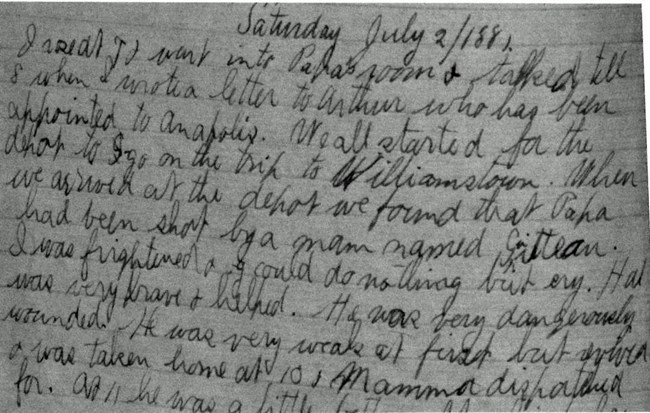Last updated: June 29, 2023
Article
Garfield Telegraph July 2023

By W.A. Rogers for Harper’s Weekly
Why didn’t Secret Service stop Garfield’s assassination?
The short answer to that question is that was not their job.
The Secret Service was founded on July 5, 1865, as a part of the Department of the Treasury. Its initial job was to help protect the economy from counterfeiting, not to protect the president.
This leads to the bigger question of whom did the presidents use as protection before the Secret Service? For the most part they used no one, although in some instances they relied on army personnel.
The presidency was seen as the people’s office, and it was thought that they should always have access to it. Before there was 24-hour presidential protection, presidents would often walk through crowds unattended. In fact, it was not until the third assassination of a president that protecting the president was even a priority. In 1902, a year after President William McKinley’s assassination, the Secret Service started to protect the president only using two full-time agents. Then in 1917, the service branched out and also started to protect the president’s immediate family.
After the attempt on President Harry S. Truman in 1951, the Secret Service became the permanent protectors of the President of the United States. Finally, in 1965, not only did it become a federal crime to try to assassinate the president, but the Secret Service was now assigned to protect former presidents and their families for the rest of their lives.
In 1968, after the assassination of Robert F. Kennedy, the Secret Service began protecting presidential candidates.

Library of Congress
‘My God, what is this?’
President James A. Garfield was on his way to the train platform of the Baltimore and Potomac Railroad Station in Washington, D.C., when he was shot by Charles J. Guiteau. The President had no body guard, official or otherwise.
The date was Saturday, July 2, 1881. The time was about 9:30 in the morning. Garfield was in the company of his Secretary of State, James Gillespie Blaine. He was on his way to Elberon, New Jersey, to rendezvous with his wife, Lucretia, who was recovering from a near fatal attack of malaria contracted in May. They had planned a weeks-long vacation.
On being shot, the president is said to have cried out, “My God, what is this?”
He collapsed. Moments later, sons Harry, 17, and Jim, 15, were on the scene. As Jim described it in his diary later that day, “I was frightened & I could do nothing but cry. Hal was very brave & helped. He [Papa] was very dangerously wounded…”
Returned to the White House, the president hovered between life and death for the next two-and-a-half months.
Gambling was not popular with the president’s mother
Eliza Ballou Garfield, the president's mother, disapproved of card playing to her dying day. Her grandchildren remember an evening late in her life when she appeared at the door of the room in which her grandson Hal was playing cribbage with his fiancée Belle.
Eliza said, "I have heard of female gamblers, but I have never seen one before." Then she went off to bed, highly pleased with having spoken her mind.
FREE monthly events
July 1 at 7 p.m.: The Cleveland Shakespeare Festival presents “As You Like It” on the lawn behind the Garfield home. No reservations are required. Bring your own lawn chairs and picnic. (Alcohol is not permitted.) July 7 at 10 a.m.: Witness dozens of individuals from nations across the globe take the oath as America’s newest citizens at a naturalization ceremony. July 12 at noon at Mentor Public Library: Leaders & Legacies of the Civil War Era: “The Battle of Gettysburg” (Encore). The largest and deadliest battle of the entire Civil War took place in and around a small southcentral Pennsylvania town called Gettysburg from July 1-3, 1863. Learn more about this pivotal battle that many argue is the most consequential battle of the war and inspired President Abraham Lincoln’s Gettysburg Address a few months later. Call the library at (440) 255-8811 for reservations. July 15 at 2 p.m. Book and author talk with C.W. Goodyear. He will present his new book “President Garfield: From Radical to Unifier.” He’ll speak about what sparked his interest in Garfield, what surprised him while researching the book, and more. Program is free of charge; books will be for sale in our bookstore. July 29 at 7 p.m.: The Cleveland Shakespeare Festival presents “Measure for Measure” on the lawn behind the Garfield home. No reservations are required. Bring your own lawn chairs and picnic. (Alcohol is not permitted.) July 30 at 2 p.m.: The Lakeland Community College Summer Band performs an outdoor concert on the lawn. Bring your own lawn chairs and picnic. (Alcohol is not permitted).
